
Mussidae is a family of stony coral in the order Scleractinia. Following a taxonomic revision in 2012, the family is now restricted to species found in the Atlantic Ocean, with Pacific species transferred to the new family Lobophylliidae. Many species are referred to as brain coral because their generally spheroid form and grooved surface resembles the convolutions of a brain.
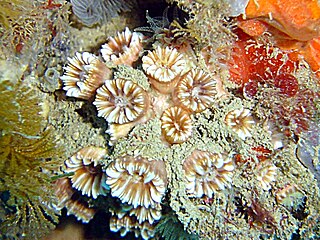
The Caryophylliidae are a family of stony corals found from the tropics to temperate seas, and from shallow to very deep water.

Acanthastrea is a genus of large polyp stony corals in the family Lobophylliidae. The colonies are massive and usually flat. The corallites are either circular or angular in shape. The septa are thick near the wall of the corallite, becoming thin near the columella, and have tall teeth. The polyps are extended only at night.
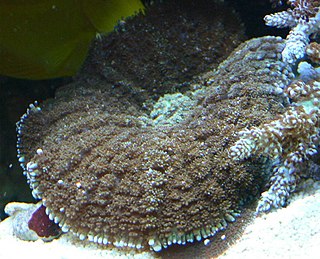
Rhodactis is genus of "mushroom corals", which are characterized by large individual polyps that are often reminiscent of a mushroom. Rhodactis are related to stony corals but do not produce a stony skeleton.

Gorgoniidae is a family of soft corals, a member of the subclass Octocorallia in the phylum Cnidaria. Nearly all the genera and species are native to the east and west coasts of America.
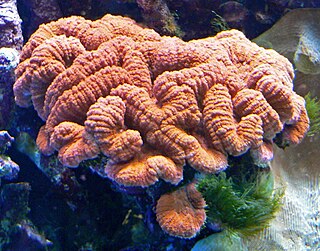
Lobophyllia, commonly called lobed brain coral or lobo coral, is a genus of large polyp stony corals. Members of this genus are sometimes found in reef aquariums.

Scolymia, commonly called scoly coral, is a genus of large polyp stony corals. Members of this genus are sometimes found in reef aquariums.

Dendrophylliidae is a family of stony corals. Most members are azooxanthellate and thus have to capture food with their tentacles instead of relying on photosynthesis to produce their food. The World Register of Marine Species includes these genera in the family:

Primnoidae is a family of soft corals.

Meandrina is a genus of colonial stony coral in the family Meandrinidae. Corals in this genus form massive hemispherical heads or have large flat plates and can grow to a metre (yard) across. Sometimes it is referred to as.

Rhizangiidae is a family of stony corals in the order Scleractinia. This family is closely related to Oculinidae. Members of this family are non-reef building corals and reproduce from stolons. The corallites are small and the septa are simple.

Merulinidae is a family of reef-building stony corals.

Dendrophyllia is a genus of stony cup corals in the family Dendrophylliidae. Members of this genus are found at depths down to about 900 metres (3,000 ft). They are azooxanthellate corals, meaning that they do not contain symbiotic photosynthetic dinoflagellates as do many species of coral.

Mycetophyllia is a genus of stony corals in the family Mussidae, commonly known as ridged cactus corals. Members of this genus are native to the Caribbean area. They are zooxanthellate species and are sometimes kept in reef aquaria.

Flabellidae is a family of marine corals. It consists of the following genera:
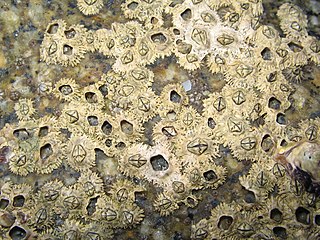
The Hexanauplia constitute a class of crustaceans, comprising two groups: the Copepoda and the Tantulocarida. The former subclass Thecostraca was elevated to class rank and removed from Hexanauplia in 2021.

Leptastrea is a genus of massive reef building stony corals known primarily from the Indo-Pacific. Although previously assigned to Faviidae, Budd et al. (2012) assigned it to Scleractinia incertae sedis based on phylogenetic results demonstrating the polyphyly of Faviidae.
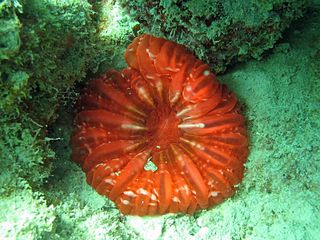
Cynarina is a genus of stony corals in the family Lobophylliidae.

Psammocora is a genus of stony coral in the monotypic family Psammocoridae. Species of this genus are also known as cat's paw coral.

Heterocyathus is a genus of coral of the family Caryophylliidae.




















